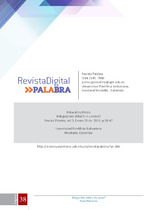Bilingualism: What’s in a name?

View/
Date
2014Author
Polovatina, Polina
xmlui.dri2xhtml.METS-1.0.item-type
article
Citación
Metadata
Show full item recordDocuments PDF
Abstract
The article takes another look at the National Bilingualism Plan through a discussion of the popular terms such as bilingualism, language knowledge, and nation. I argue that they are becoming common knowledge and often replace terms of overlapping or completely different meanings. The article also demonstrates that the Plan creates a particular image of the nation and its place in the world. Consisting of various proposals, it fails to present a clear policy, which opens doors to often contradictory interpretations and therefore fears and resistance to it. While reconsidering the role of bilingualism in reshaping the society, I propose to focus on the process of learning and knowledge instead of language as such, and an individual instead of a group. El artículo hace un repaso al Programa Nacional de Bilingüismo a través de la discusión de los términos tales como el bilingüismo, el conocimiento lingüístico y la nación. Yo sostengo que estos términos están siendo utilizados como conocimiento común y sustituyen a menudo términos con significados completamente diferentes. El Plan no presenta una política única. Esto crea múltiples interpretaciones, a menudo contradictorias y por lo tanto, los temores y la resistencia al programa y a la idea del bilingüismo. En mi discusión me enfoco en significado cognitivo y educativo del bilingüismo. Yo propongo que es más útil centrarse en el proceso de aprendizaje y en conocimiento en lugar del lenguaje como tal, y un individuo en lugar de un grupo.
Keyword/s
Bilingualism
Nationalism
National Bilingualism Plan
Empowerment
Language
Bilingüismo
Programa Nacional de Bilingüismo
Nacionalismo
Empoderamiento
Lenguaje
Collections
- Vol. 3 No. 1 (2014) [10]
The following license files are associated with this item:

